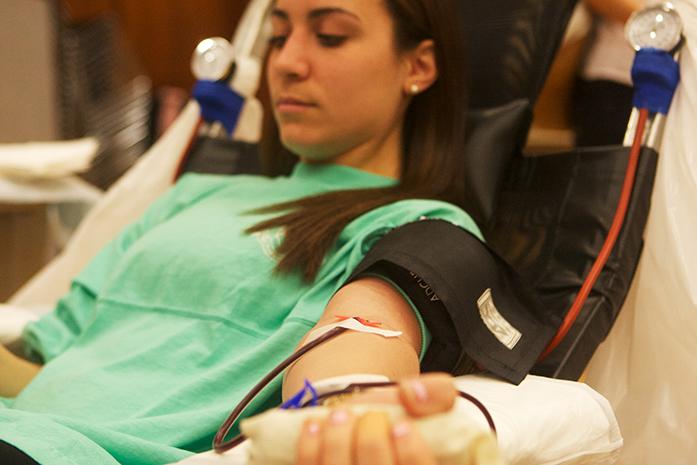Iowa blood-donation centers call for donations after canceled blood drives
Iowa centers for blood donation are adapting to enhance safety and precaution measures while still encouraging the public to donate amid the COVID-19 pandemic.
Nikki Gierman donates blood for the Greek Week blood drive at the IMU on Monday, April 7, 2014.
March 26, 2020
While the COVID-19 pandemic has driven common blood-drive locations — schools, businesses, and churches — to close their doors, blood banks and donation centers are adopting new measures to ensure a blood shortage does not occur.
Staff and volunteers at the American Red Cross organization, which provides about 40 percent of blood products for hospitals throughout the nation, are taking proper safety and procedure precautions to ensure the health of all donors, said Josh Murray, regional communications director for the American Red Cross organization.
Spacing out beds, staggering appointments, and encouraging people to come in on their own and give blood, are top priorities for the Red Cross amid the COVID-19 outbreak, Murray said.
Increasing donors has always been a goal for the Red Cross, Murray said, but the task remains critical now more than ever with countless blood drives being canceled.
“Blood products that get donated have a shelf life of 42 days, and so we have blood on the shelf, but that’s getting used every day, whether it’s for people involved in an accident or cancer patients [who] need transfusions,” Murray said.
He added that when fewer people show up to donate and more drives get canceled, it’s important to keep rebuilding that supply before it dwindles.
“Certain things [still] have to be done under shutdown,” Murray said.
Kirby Winn, public relations manager for the Mississippi Valley Regional Blood Center, said that the center — which is provider for Mercy Hospital in Iowa City and Iowa City Veterans Affairs Health Care System — has been experiencing a very high rate of blood drive cancellations, while many blood drives still continue to take place.
RELATED: UI Health Care, Mercy leaders urge against shelter-in-place order
While losing donations from canceled blood drives, however, Winn said there’s been a strong number of individual blood donations to help the center get by.
“Our donation centers, for instance the one in Coralville, are really doing well and we’re grateful for the public for stepping forward and providing what’s needed,” Winn said.
Mississippi Valley Regional Blood Center is also making changes to its blood-donation policies as an effort to mitigate the spread of COVID-19, he said. Standard procedures already call for heightened sanitation measures given the medical environment of blood-donation centers, Winn said, and now more than ever these procedures are being heavily reinforced.
Currently, anyone who wants to give blood at one of Mississippi Valley’s donation centers is required to schedule an appointment, Winn said, and the center will no longer accept walk-ins.
“We want to make sure that people are arriving to give blood in an orderly fashion and spacing their donations appropriately according to the time of day,” Winn said.
Blood donation is vital for many medical procedures that don’t involve COVID-19, including cancer treatments, surgeries, transplants, complications related to childbirth, accidental traumas and more, Winn said. It’s an essential service that must be continued, he added.
“We don’t want the blood supply to be an unintended consequence of all the changes we’ve made during the pandemic,” Winn said.
Kerry DuBay, donor center supervisor for DeGown Blood Center, a hospital-based blood center that collects blood for University of Iowa Hospitals and Clinics and Stead Family Children’s Hospital, said the center has not had to cancel any blood drives yet.
“We’ve actually seen a great response from donors thus far, and so we’ve actually been very busy with an outpouring of support from their local communities,” she said.
The center continues to adjust donation schedules and locations daily to ensure the collection of blood is still possible, DuBay said. Visitors and employees are screened before entering the hospital, she added, and screenings take place at blood drives as well.
“We never know what tomorrow will bring as far as people tested positive and donors being eligible to donate,” she said. “We encourage people to donate today so that we continue to maintain that good blood supply.”
The DeGowin Blood Center has been working with sponsors to get special permission to remain in buildings that have been closed to the public, DuBay said. The center has recently held blood drives in the hospital, Swisher, and Coralville. It is hosting one in North Liberty Thursday night.
“The need for blood never goes away,” DuBay said.



